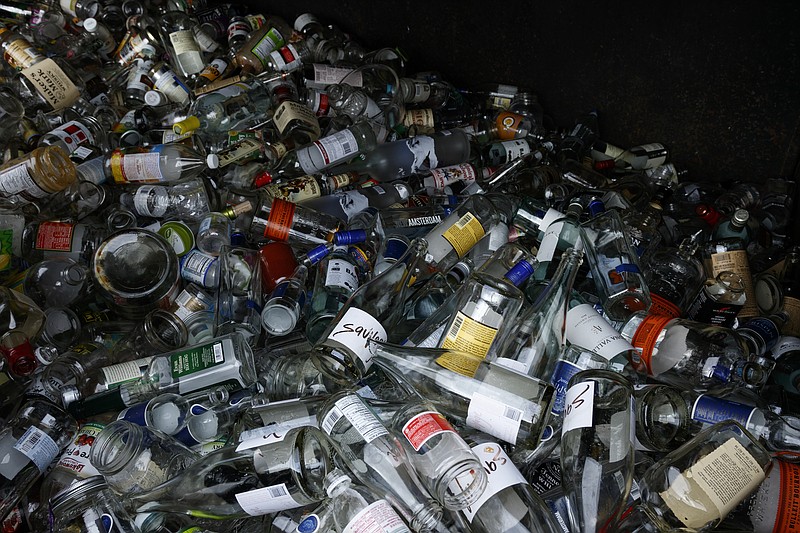Take the survey
Today is the last day to tell Chattanooga what it should do about curbside recycling for glass. Register your opinion at www.surveymonkey.com/r/7BNQ562.Chattanooga residents can sign up online for curbside recycling or call 311 or 423-643-6311.
Today is the last day for Chattanoogans to weigh in on what to do about glass in curbside recycling.
The city told the 28,000 or so participants in its curbside recycling program last month it could no longer accept glass in the big blue recycling bins. It set up an online survey to seek input on options.
The problem is that glass tossed into bins often shatters into shards, chips and splinters that can't easily be separated from paper, plastic, cardboard and other recyclables. Contaminating a bin with glass means the entire contents will end up being landfilled rather than sorted or reused.
The survey asks people if they would support a two-bin system to separate glass from other recyclables, and whether they would be willing to pay a monthly fee for such a system.
Not surprisingly, the answers to date are "yes" and "no," respectively, said city Public Works Director Justin Holland. A few more than 3,800 people have taken the survey to date, recycling coordinator Kim Smith said Thursday afternoon.
"The survey results were pretty resounding - people wanted to keep recycling glass if they could, but didn't feel like making additional payment," Holland said.
He said the city's garbage pickup program has about 65,000 customers, and he's always looking for ways to get more participating in recycling.
"There has to be buy-in from residents," he said. "That can be tough to get because they have to do something," such as sort garbage and recyclables into separate bins.
"We try to make it as easy as possible," Holland said.
Smith said she has seen lots of emails with comments, concerns and suggestions to continue glass recycling even if not curbside.
"Some of the ideas that have come through are great," Smith said. "We're trying to find a way to make it work."
This is yet another evolution in the program that dates to the early 1990s, when residents first were able to sort recycling into blue bags for curbside pickup.
That didn't include glass, however. That material had to go either to one of the city or Hamilton County drop-off centers, where it was sorted, or to the landfill.
That changed when the city went from bags to bins. Customers could put all their recyclables into 96-gallon blue containers that were taken to Orange Grove's recycling center for sorting.
But the glass proved too hard to handle at the facility where 80 or so of Orange Grove's clientele of physically and developmentally disabled people were employed. The center had nearly completed a $1.2 million fundraising campaign for a glass sorting system when a new federal regulation changed the whole system in mid-2016.
The rule required Orange Grove to shift from employing people inside its facility to finding jobs or other occupations out in the community. The sorting line shut down and the decades-long partnership between the nonprofit agency and the city had to evolve.
"That was a real challenge for us because we had been partnering with Orange Grove for a number of years," Holland said.
Heidi Hoffecker, director of development for Orange Grove Center, said its clients still run the city's five drop-off centers: on Brainerd Road, East Third Street, Kellys Ferry Road, Batters Place Road and North Access Road. The drop-off centers are staffed with six people every day.
Other people who used to work on the sorting line have found other jobs or volunteer opportunities, she said, or get out into the community through leisure activities.
"All of those people [who lost jobs when the sorting stopped] were quickly placed elsewhere," she said.
Some work in Orange Grove's Recycle Express program, which sends a truck and crew of three to business locations to pick up recyclables. That program has about 100 customers now and is looking for more, said Wes Henderson, with Recycle Express.
Orange Grove also operates a document shredding business that isn't affiliated with the city. About 100 customers pay to have materials picked up and taken to the John Germ Recycling Center on Dodson Avenue for secure destruction.
The city's curbside recycling now is sorted by WestRock, a private business, but Orange Grove contracts with Chattanooga to find buyers for the products.
"We charge them with finding us the best price, the most revenue we can get for the material," Holland said.
The center recently worked out a deal to place bins at Goodwill collection sites specifically for electronics, which are complicated to recycle.
The city has been "wonderful partners, good friends" with Orange Grove over the years," Hoffecker said.
Holland said that is the city's "commitment to support a great organization in our city and support our most vulnerable citizens."
He said the city will use the survey results as it decides how to go forward with its glass reycling program. The goal is to have a plan and a budget in mind for the fiscal year starting July 1.
Contact staff writer Judy Walton at jwalton@timesfreepress.com or 423-757-6416.
